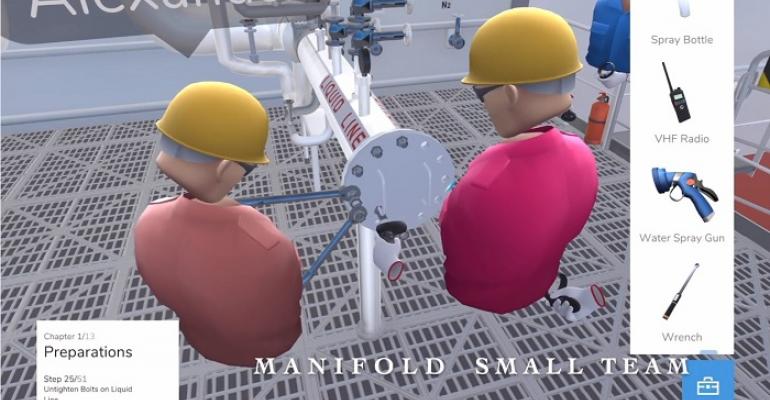Kanda developed it’s Virtual Reality LNG Bunkering Procedure Course in conjunction with EPS, which has growing number of LNG-fuelled vessels in its fleet. Kanda was previously part of EPS’s tech accelerator programme fostering start-ups in the maritime space.
“Being an alumni of the Eastern Pacific Shipping and Techstars Accelerator programme has been a great experience. Collaborating with EPS post-programme and having continued access to their network and in-house subject matter experts was instrumental in bringing certified VR training to the market,” said Kanda CEO Kristian Andreasen.
The course has now attained classification approval from LR and Kanda expects to see increasing demand not only from EPS which will have over 50 dual-fuelled vessels on the water in the next two years, but also the wider market where LNG as a marine is gaining traction.
Andreasen, commented: “The VR LNG Bunkering Course is great for creating the sense of presence in the simulation, but also for blended learning courses which includes theory, familiarisation and simulator training. We see a great advantage in allowing trainees to join into the simulation not only from VR headsets, but also tablets and regular PC's. This allows for a truly shared digital space where trainees can share experiences and collaborate regardless of what platform they join from.”

By opting for VR based training costs can be saved both in terms of physical simulators and travel, and Kanda says it allows them to reduce the cost of training by 75%.
EPS Special Advisor for Innovation Gil Ofer, commented: “Kanda’s VR training offers significant health and environmental benefits. VR training means human contact is kept to a minimum, reducing the risk of transmitting viruses, like Covid-19, between seafarers across international borders. In turn, this lowers carbon emissions by removing the need for trainees to travel long distances to specialist training centers.”
By practicing in the virtual environment EPS’ believes that the LNG bunkering course allows seafarers to memorise processes and procedures before having to carry them out in real life.
"Because of the immersive nature of VR, students can get a feel for the true scale of the vessels they will be working on and the equipment they will be operating, making them better prepared for actual operations,” Ofer said.
Copyright © 2024. All rights reserved. Seatrade, a trading name of Informa Markets (UK) Limited.
Add Seatrade Maritime News to your Google News feed.  |

